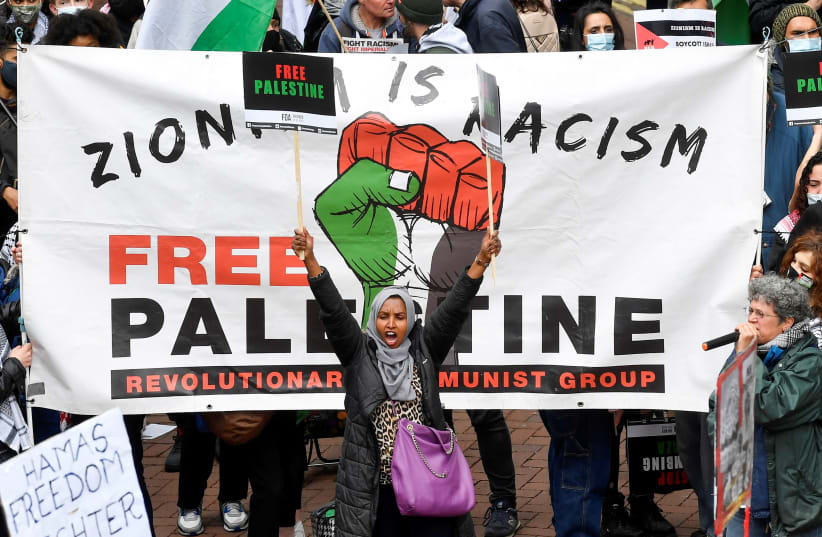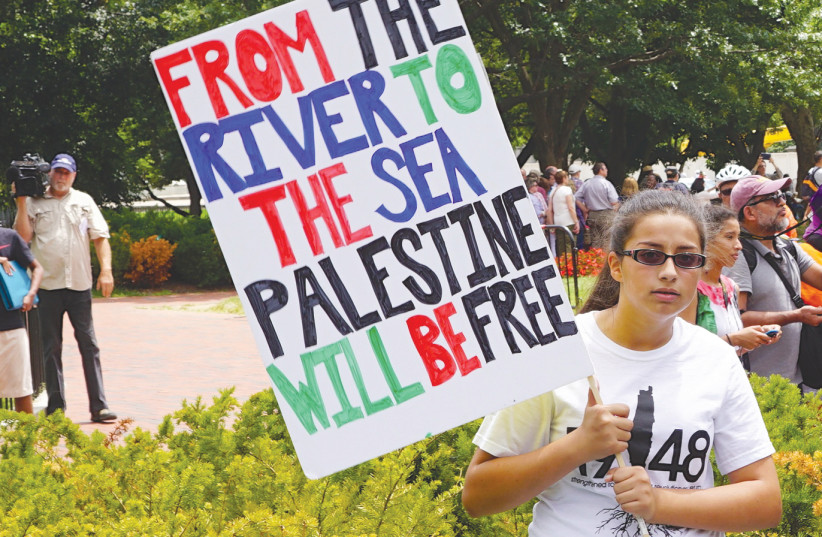“Federal prosecutors have charged a pro-Palestinian activist with a hate crime for an assault on a pro-Israeli Jewish man that took place following an April protest in Midtown, Manhattan,” reported The New York Post on Thursday. This sets an important precedent.
According to Gerard Filitti, a Senior Counsel at The Lawfare Project and the man representing the victim, Matt Greenman, “the US Attorney’s office is sending a clear message that hate crimes targeting Jews have serious consequences.”
Why is this important?
Around the world, anti-Israel protests often serve as cover for extremist anti-Jewish rhetoric and violent protests. In many places, this has been normalized and mainstreamed.
This is particularly the case in the West where pro-Palestinian rhetoric and extremism tends to run counter to the ostensibly progressive left-leaning milieu in which it takes place. What this means is that there is often violence, chauvinist, nationalist and religious extremist behavior and rhetoric that uses the cover of protests against Israel to push far-right concepts like blood-and-soil nationalism.
For instance, during the Israel-Hamas conflict in May 2021, a convoy of pro-Palestinian male activists drove through London threatening to rape Jewish women. Four of the men were charged.
A convoy of men waving nationalist flags threatening to rape women is the kind of thing that would usually be recognized as far-right extremist fascist behavior. The use of rape as a weapon of conquest, war and genocide has long been recognized as a crime by the international community. During the ISIS genocide against Yazidis, for instance, rape was used as a weapon; as it was in the Balkan conflicts that involved ethnic cleansing.
Hatred of Jews and increasingly violent acts and incitement to violence are part of the milieu of many pro-Palestinian events in the West.
The question now is whether the case in New York might serve as an example of how this extremist ideology of male dominance and violence, harkening back to the dark days of fascism and pogroms, can be highlighted using hate crimes laws and whether those on the far-left who have long been fellow travelers with far-right pro-Palestinian nationalists will distance them from the toxic masculinity and antisemitism that exists.
So is anything actually changing?
It is difficult to know if the tide is turning on this issue. For instance, during the London convoy, the men used a speaker to curse Jews. In Yemen, the Houthi movement which is backed by Iran has as its official slogan "God is Great, Death to America, Death to Israel, Curse on the Jews, Victory to Islam" in Arabic text. This isn’t some secret complex esoteric discussion about what a saying from a religious test means, this is an example of the clear statement linking hatred of Jews and Israel and religious extremism.
In 2018, the Houthi leader was invited to write an oped in The Washington Post, giving space to the antisemitic far-right movement without them disavowing their genocidal antisemitism.
In another instance mixing religious extremism with anti-Israel and anti-Jewish views, protesters in Brussels in 2020 were accused of using a genocidal religious chant “Khaybar, Khaybar, you Jews, the army of Mohammed is coming” during what was supposedly an “anti-Israel” protest.
According to an article at the JC, “the chant can be heard in video recordings of seven separate rallies last year, all of which took place across Britain against the background of the conflict in May between Israel and Hamas.”
In some cases, western media has sought to cover up the antisemitism behind pro-Palestinian discussions. In a 2019 case, the BBC translated “yahud,” or “Jew,” as “Israel.” In another case, a pro-Palestinian activist at USC had tweeted about killing “Zionists.” In other tweets, the same activists had called for cursing “el yahood” or “the Jews.” The activist admitted “yahood is the term Palestinians use for the population that is occupying their land,” according to an article in the Jewish Journal.
Using the term “yahood” or “yahud” for Jews is equivalent to using any other term that has taken on a derogatory sense around it. “Yahud” is never used in a positive way. It is always “curse the Jews” or “death to the Jews” or “the army is returning [to kill] the Jews.”
Pro-Palestinian activism has re-packaged genocidal terminology, not dissimilar from Nazi-era rhetoric, and tried to hide it behind claims of “mistranslation.” This is a classic racist far-right methodology of creating an 'other,' in this case “yahood,” and then casting blame and hate on the other.
In another incident reported in 2019, a medical resident wrote “I’ll purposely give all the yahood the wrong meds,” according to Time Magazine. The doctor later apologized.
The pattern speaks for itself
These are not isolated incidents. From Yemen’s Houthis to student activists to interviews in Gaza, the use of the term “yahood” as a term of abuse for Jews is clear. The interlinking between far-right Islamist groups, pro-Palestinian nationalists and pro-Palestinian activists created a toxic nexus where the activists supposedly protesting Israel’s actions end up being used as cover for hate speech, incitement, racism and antisemitism.
For instance, in several cases, mosques in Montreal in 2017 hosted a cleric born in the West Bank who called Jews “the most evil of mankind” and “human demons.” He claimed to quote from religious tradition, saying “the end of time … the stone and the tree will say: ‘Oh Muslim, oh servant of God, there is a Jew behind me – come and kill him!’”
This is the corruption of religious texts to spread modern-day hate. In another incident, an article at the JCPA noted that an Imam spread Holocaust denial and called Jews “the sons of pigs and apes,” which blends toxic antisemitism, Holocaust denial and religiously-motivated hatred.
The almost endless list of these incidents illustrates how they are interlinked. One issue is the element of privilege, a specifically male religious extremist privilege that is provided to the antisemitic views of these activists. They use religion or nationalism as cover, as voices of hate have done throughout history, and they are often able to get an excuse or pass from media and other anti-Israel activists.
Historically, anti-Israel violence was excused in the West in the 1960s and 1970s. It was explained under the guise of “armed struggle.” In a recent case a member of the extremist group called the “Japanese Red Army” was released from prison after two decades. The article at the BBC about the release noted that the woman who was released “has previously expressed regret for 26 deaths caused by an attack on Tel Aviv's Lod Airport in 1972.”
During that era, a number of these groups, such as the Red Army Faction, also known as the Baader–Meinhof Group from Germany, were involved in attacks on Jews and Israel. The privileged members of the groups were not Palestinians but they used the impunity and cover of being “pro-Palestinian” to carry out attacks that often resulted in short prison sentences.
This was because the narrative at the time provided privilege for those who carried out “armed struggle” killing Israeli or Jewish civilians. Whether it was the Munich Olympics or hijacking planes, as long as the murderers claimed to do it against Israel, they generally got some sympathy.
It is a direct line from that violence to today because the general meta-narrative has been that violence against Jews can be excused as long as some plausible “anti-Israel” explanation can be found.
Charging one man with a hate crime could be a turning point because it sends the message that hiding behind these acts being against Israel or being “struggling” may no longer work now that hate crimes legislation can be used to protect Jews and other minorities.
It is a question as to whether prosecutors are willing to use the new tools at their disposal to note that crimes involving attacks on synagogues or Jews by people shouting “from the river to the sea” or “yahood” are part of a wave of hate crimes, not “protests” or “struggle.”

